|
|
|
Sort Order |
|
|
|
Items / Page
|
|
|
|
|
|
|
| Srl | Item |
| 1 |
ID:
149369
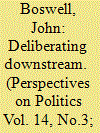

|
|
|
|
|
| Summary/Abstract |
Key theorists and scholars of democracy have focused on understanding and enhancing the institutions and practices that shape decision-making. Indeed, the most influential contemporary normative account—the deliberative version—though increasingly adapted to the complex realities of contemporary politics, retains a tight focus on the conditions of legitimate will formation. This remains the core underpinning of the normative impetus for innovation and reform in contemporary democratic politics. Yet missing from even the adapted deliberative account is detailed consideration of what happens after will formation. I turn here to the policy and administration literature to show how the inescapably attritional and opaque policy process can magnify asymmetries that theorists and scholars of contemporary democracy, chief among them deliberative democrats, ought to be much better attuned to. I argue that in failing to consider these problems adequately, contemporary democratic thinkers, scholars, and reformers risk lending legitimacy to institutions and practices that might sustain the very biases they are mobilized against. As such, I identify institutional innovations and governing practices that can embed aspects of democratic deliberation “downstream” in the policy process in order to counter distortions and rebalance asymmetries. I conclude by calling for theorists, researchers, and reformers to explore the value of these institutions and practices, and to expand the repertoire of governing mechanisms available to counter the distortions that occur through the policy process.
|
|
|
|
|
|
|
|
|
|
|
|
|
|
|
|
| 2 |
ID:
089887
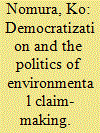

|
|
|
|
|
| Publication |
2009.
|
| Summary/Abstract |
The rapid expansion of the Indonesian pulp industry has caused considerable environmental problems. Some argue that the state and the industry have addressed this issue rather successfully through technological amendments and effective civic involvement without hindering economic growth, which could be described as a path towards ecological modernization. However, the problems caused by Indorayon, Indonesia's first pulp and rayon company, show that this path can neglect the social aspects of sustainable development, without fully respecting the political rights of the local people, even after the end of authoritarian rule. In both the Suharto and post-Suharto periods, the state and Indorayon successfully prevented the civil society movement from making effective claims relating to their environmental concerns through oppression and a 'scientific' discourse emphasizing the economic and environmental aspects of the factory operations. Recognizing that such efforts have resulted in long-lasting social conflicts, this article illustrates the limit of the impact of democratization on environmental policy making in Indonesia, and the difficulties in using ecological modernization as a policy guideline for a sustainable society in the global South.
|
|
|
|
|
|
|
|
|
|
|
|
|
|
|
|
| 3 |
ID:
111514


|
|
|
|
|
| Publication |
2012.
|
| Summary/Abstract |
This article presents the Indian electricity sector as a case study of the evasion of responsibility in public policy. India's electricity policy repeatedly fails to meet its own targets and is universally lambasted as inadequate. The state appears aware of many of the reasons for these failures, yet policies have consistently failed to make effective corrections. Part of the explanation for this institutional and policy stasis lies in the pervasive shirking of responsibility by actors throughout the electricity sector. The sector is analysed to explore the mechanisms through which responsibility is displaced, deflected or dissipated. These mechanisms include 'agency', 'presentational' and 'policy' strategies, which are both pre-emptively and reactively deployed. Using these strategies, responsibility is shifted through (1) institutional architecture which formally delegates power to other actors, especially exploiting the ambiguity in federalism, sectoralism, privatization and decentralization; (2) rhetorical displacement of blame onto other actors or 'exogenous' factors and (3) everyday policy procedures and bureaucratic practices designed to distance officials from decision making. By negating the requirement for institutional and analytical responsiveness, these evasions of responsibility perpetuate systemic failures and undermine the credibility of the Indian state.
|
|
|
|
|
|
|
|
|
|
|
|
|
|
|
|
| 4 |
ID:
147648
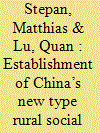

|
|
|
|
|
| Summary/Abstract |
This study explores the processes and outcomes of the public policy reforms from 2002 to 2014, targeting income security among the elderly for a segment of the Chinese population that was increasingly marginalised throughout the 1990s: the rural population. The authors reconstruct the policy process from 2002 until 2014 that led to the establishment of the New Type Rural Social Insurance Pension and assess its impact on providing adequate and sustainable old-age income. One particular focus is the study of the influence of international actors. Yet, as key to the success of the initiative, the authors identify the decisive support of the central level leadership, which facilitated the process by announcing a new development model and providing earmarked transfers from the central government. Despite the improvements in the income security of elderly rural Chinese, questions remain about the Chinese pension system’s long-term sustainability and the influence of the system’s fragmentation on social mobility and equality.
|
|
|
|
|
|
|
|
|
|
|
|
|
|
|
|
| 5 |
ID:
171203


|
|
|
|
|
| Summary/Abstract |
What explains the passage of Thailand's landmark universal healthcare (UHC) policy? In separate contributions, Selway and Harris emphasized the role of electoral rules and political parties, on one hand, and “professional movements” of developmentally minded state bureaucrats on the other. Which is correct? In this article, Selway and Harris respond to each other's work. While Selway agrees that the actions of the professional movement constitute an underappreciated necessary condition for universal healthcare in Thailand, he argues that Harris overstates the role of the movement in implementation. Harris defends his position and maintains that an institution-focused account is insufficient, arguing that the actions of Thailand's Rural Doctors’ Movement not only explain universal healthcare but also gave rise to the very electoral rule changes that Selway argues were so critical to facilitating universal coverage. Selway responds to these criticisms, and the two researchers jointly consider implications for causation, qualitative research, and policymaking theory.
|
|
|
|
|
|
|
|
|
|
|
|
|
|
|
|
| 6 |
ID:
150008


|
|
|
|
|
| Summary/Abstract |
In 2006, the British government launched a policy to build nuclear power reactors based on a claim that the power produced would be competitive with fossil fuel and would require no public subsidy. A decade later, it is not clear how many, if any, orders will be placed and the claims on costs and subsidies have proved false. Despite this failure to deliver, the policy is still being pursued with undiminished determination. The finance model that is now proposed is seen as a model other European countries can follow so the success or otherwise of the British nuclear programme will have implications outside the UK. This paper contends that the checks and balances that should weed out misguided policies, have failed. It argues that the most serious failure is with the civil service and its inability to provide politicians with high quality advice – truth to power. It concludes that the failure is likely to be due to the unwillingness of politicians to listen to opinions that conflict with their beliefs. Other weaknesses include the lack of energy expertise in the media, the unwillingness of the public to engage in the policy process and the impotence of Parliamentary Committees.
|
|
|
|
|
|
|
|
|
|
|
|
|
|
|
|
| 7 |
ID:
176749


|
|
|
|
|
| Summary/Abstract |
The current transformation of energy systems around the world is fundamentally a policy-driven process, unlike previous socio-technical transitions. This article focuses on the challenges of constructing forward-looking policies for sustainable energy transitions in the presence of powerful incumbent interests, through an in-depth study of how the emerging option of demand-side response (DSR) was incorporated into the Capacity Market (CM) for electricity in Great Britain over the period 2010 to 2014. Drawing on extensive documentation related to the development of the CM rules and interviews with participants and close observers of the process, the paper provides an unusually detailed assessment of the influence of companies with large electricity generation assets. The evidence presented supports the hypotheses that these companies had influence through deploying public facing strategies, that they had been able to draw on close networks of contacts and networks with senior policy makers, and that the latter had internalised the ideas and interests of the former. Despite counter-lobbying by DSR firms and non-governmental organisations, institutional arrangements gave major generators an advantage in terms of access. The paper concludes by recommending the establishment of independent bodies to propose policies and monitor the process of their development during energy system transformations.
|
|
|
|
|
|
|
|
|
|
|
|
|
|
|
|
| 8 |
ID:
088393
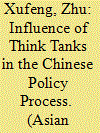

|
|
|
|
|
| Publication |
2009.
|
| Summary/Abstract |
This article argues that expert knowledge, governmental linkage, and personal ties are the factors that determine think tanks' influence in the Chinese policy process. Moreover, different types of think tanks exert influence through different mechanisms. Empirical data are from a 2004 nationwide survey of 301 of China's think tanks.
|
|
|
|
|
|
|
|
|
|
|
|
|
|
|
|
| 9 |
ID:
146817
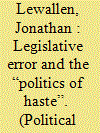

|
|
|
|
|
| Summary/Abstract |
Legislative error is an important and understudied element of the policy process. Even simple clerical mistakes—if unnoticed before enactment—can lead to ambiguity about a law’s meaning, spark political battles concerning rulemaking and implementation, and involve the courts in statutory interpretation. Understanding how and why error occurs can help us better understand how political institutions are intertwined in the design, enactment, and implementation of public policy. This article analyzes the sources of legislative error using data on corrected legislation in the US Senate from 1981 to 2012. The author finds that Senate drafting error is related to unified control of Congress and new majority parties, inexperienced committee members, and committee workload. In addition to bringing in different perspectives and preferences, elections can affect a legislature’s ability to draft clear, error-free statutes.
|
|
|
|
|
|
|
|
|
|
|
|
|
|
|
|
| 10 |
ID:
151147
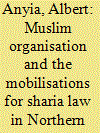

|
|
|
|
|
| Summary/Abstract |
This paper examines the role of Muslim religious organisations in northern Nigeria as religious interest groups in relation to government decision-making, including their role as ‘superior Muslim influence’ in the introduction and dissemination of Sharia law in 12 northern states in Nigeria. Two of the most prominent Muslim organisations in Nigeria, the J’amatu Nasril Islam (JNI) and Nigerian Supreme Council for Islamic Affairs (NSCIA), are examined in this regard to compare and highlight their lobbying strategies in their attempt to justify claims to representing over 80 million Muslims in Nigeria. This paper suggest that Islam and the support from Muslim organisations were significant influences on government policy-makers involved in the process of adopting Sharia law in the northern states. Overall, this paper concludes that Muslim organisations have superior influence, have significantly marginalised non-Muslims and have focused on Sharia law policy, thus enabling an analysis of the relationship between religion and politics in Nigeria.
|
|
|
|
|
|
|
|
|
|
|
|
|
|
|
|
| 11 |
ID:
044048


|
|
|
|
|
| Publication |
New York, Appleton-century crofts, 1969.
|
| Description |
vii, 387p.Pbk
|
| Standard Number |
390E58245X
|
|
|
|
|
|
|
|
|
|
|
|
Copies: C:1/I:0,R:0,Q:0
Circulation
| Accession# | Call# | Current Location | Status | Policy | Location |
| 004113 | 658.403/LYD 004113 | Main | On Shelf | General | |
|
|
|
|
| 12 |
ID:
086765


|
|
|
|
|
| Publication |
2009.
|
| Summary/Abstract |
This article analyses the policy-making role of Portugal's heads of state in the period 1976-2006. Not only is Portugal rarely studied in the English language comparative literature, but there is no consensus concerning the proper definition of the country's system of government, whether it is semi-presidential or parliamentary. This article presents new data on the Portuguese president's role in the following areas: cabinet appointment and dismissal; parliamentary dissolution; ministerial appointments; referral of legislative bills to judicial review; veto powers; and agenda-setting through going-public tactics. It is concluded that the president's role in the policy process has never been irrelevant. While the 1982 constitutional reform did eliminate the possibility of undisguised presidential government, presidents have continued to be important in policy making, particularly due to use of their veto and dissolution powers. Therefore, the article argues that Portugal has remained solidly semi-presidential.
|
|
|
|
|
|
|
|
|
|
|
|
|
|
|
|
| 13 |
ID:
119223
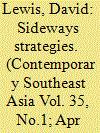

|
|
|
|
|
| Publication |
2013.
|
| Summary/Abstract |
Studying individuals who move from civil society into government in an effort to pursue reform agendas provides important "bottom up" insights into the complexity of policy processes. Using a set of original life history data collected in the Philippines, this article analyses the experiences of such crossover reformist efforts in post-Marcos Philippines in the field of agrarian reform. Taking each of the four governments of the period in turn, a set of themes are discussed including entryism as a political strategy, political patronage, organizational culture, role transitions and activist identities. The article concludes with the idea that the boundary between state and civil society is an important, relatively unexplored area of political activity. By opening up this area as an arena of contentious politics, an ethnographic approach tells us more about the challenges and complexity encountered by those attempting to influence policy processes from the inside, and about the policy process itself as a non-linear phenomenon.
|
|
|
|
|
|
|
|
|
|
|
|
|
|
|
|
| 14 |
ID:
142212
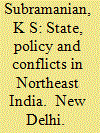

|
|
|
|
|
| Publication |
New Delhi, Routledge, 2016.
|
| Description |
xviii, 213p.: maps, tableshbk
|
| Standard Number |
9781138653443
|
|
|
|
|
|
|
|
|
|
|
|
Copies: C:1/I:0,R:0,Q:0
Circulation
| Accession# | Call# | Current Location | Status | Policy | Location |
| 058395 | 355.00954/SUB 058395 | Main | On Shelf | General | |
|
|
|
|
| 15 |
ID:
146124
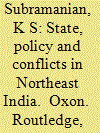

|
|
|
|
|
| Publication |
Oxon, Routledge, 2016.
|
| Description |
xviii, 213p.: map, tableshbk
|
| Standard Number |
9781138653443
|
|
|
|
|
|
|
|
|
|
|
|
Copies: C:1/I:0,R:0,Q:0
Circulation
| Accession# | Call# | Current Location | Status | Policy | Location |
| 058726 | 303.609541/SUB 058726 | Main | On Shelf | General | |
|
|
|
|
| 16 |
ID:
179969
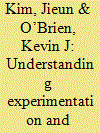

|
|
|
|
|
| Summary/Abstract |
Studies of local governance in China often point to nimble experimentation but problematic implementation. To reconcile these competing images, it is useful to clarify the concepts of experimentation and implementation and see how they unfolded in one policy area. The history of China’s Open Government Information (OGI) initiative shows that the experimentation stage sometimes proceeds well and produces new policy options, but may falter if local leaders are unwilling to carry out an experiment. And the implementation stage often poses challenges, but may improve if the Center initiates new, small-scale experiments and encourages local innovation. This suggests that the experimentation and implementation stages are not so different when officials in Beijing and the localities have diverging interests and the Center is more supportive of a measure than local officials. The ups and downs of OGI, and also village elections, can be traced to the policy goal of monitoring local cadres, the central–local divide, and the pattern of support and opposition within the state.
|
|
|
|
|
|
|
|
|
|
|
|
|
|
|
|
|
|
|
|
|